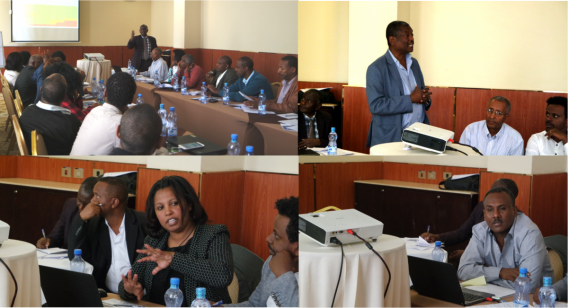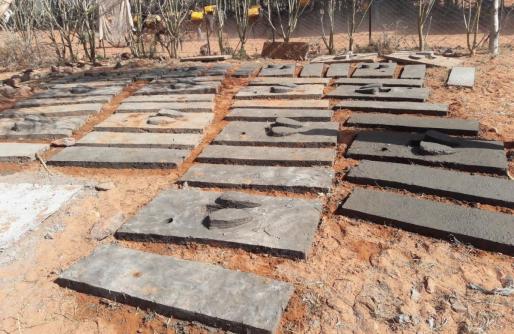Ethiopia's regions are promoting sanitation marketing following the national guidelines to drive up access to improved sanitation.
Published on: 15/12/2017
Each quarter the national Sanitation Marketing Multi-Stakeholder Platform (MSP) is reflecting on the progress made. In the last meeting we looked at how Benishangul Gumuz is promoting sanitation marketing in an emerging region. Organised by the Federal Ministry of Health (FMoH), the most recent MSP meeting was held on 7th December 2017 providing another opportunity to share the latest experiences and developments in sanitation marketing.
At the meeting, options for Public-Private collaboration in sanitation marketing were debated based on a presentation from the USAID Transform WASH team. Differences between Public-Private Partnerships (PPP) and Public-Private collaboration were debated with the former being a contractual engagement and the latter a wider set of possible supportive actions.
The latest draft Latrine Technology Options Guideline was also introduced and publication is expected soon. The FMoH with the support of the World Bank has prepared this guideline for latrine construction to standardize the quality of latrines constructed in different parts of the country.
The status of sanitation marketing progress in the different regions was also shared. Six regions namely Benishangul Gumuz, Tigray, SNNPR, Dire Dawa, Somali and Gambella are implementing sanitation marketing activities while the rest are in process to start except Addis Ababa and Afar that have not yet started. Experiences from Tigray and Afar were shared at the meeting.

Mulugeta Chernet is the Health Extension Program WASH and Social and Behavioral Change Communication Coordinator at the Tigray Regional Health Bureau. He came to Addis Ababa to share the progress made in sanitation marketing in his region. Improved sanitation coverage is reported to have increased in the region from 35% in 2015 to 43% in 2017 but in a region of 5.2 million people that still leaves a lot of people without safe sanitation.
According to Mulugeta, the progress made in sanitation marketing in Tigray is the result of a combined effort from different sectors. The Regional Health Bureau, work closely with Technical and Vocational Education and Training (TVET) centres, Small and Micro Enterprises (SME) and Micro Finance Institutions. On top of the collaboration among the sectors, various factors have contributed to the progress made. One of the main advantages in Tigray is strong government support to micro and small scale enterprises that builds on the potential sanitation marketing provides as an option for job creation. Another strength has been the priority given to improved sanitation at all levels by the health sector backed by the political commitment from the top government officials. Moreover, presence of the Regional Hygiene and Sanitation Technical Working Group and organized communities like the Women Development Groups (WDGs) have helped drive progress.
Capacity building has been a major activity in the region with 86 members of enterprises from 6 woredas trained at the Axum and Adwa TVETs. In addition, practical training was provided to 260 woreda environmental health experts and 240 Primary Health Care Unit (PHCU) directors combined with experience sharing visits. Slab moulds were distributed to all rural woredas of the region. About a quarter of the rural woredas have now started production with slabs sold to over 20,000 households. A total of 45,000 households have registered to buy slabs.

To sell these slabs, emphasis is given to demand creation through Health Extension Workers (HEWs), Women Development Groups (WDGs), religious leaders, Women Development Army (WDA) and opinion leaders. Mulugeta said, "We once tried to explain the affordability of the slabs to the farmers in terms of the price of a chicken. We told them that one slab costs equal the price of two chickens. Then, the farmers started coming to the health posts with two chickens in exchange for a slab and we started selling the slabs for two chickens. After some time, managing the chickens and selling them at the market became difficult so we stopped. However, from this experience we learned that if we communicate to the community in a way that translates to their day to day life, we can create the demand easily."
The Women's groups collect money from their members by the traditional and voluntary practice called 'Ekub'. The 'Ekub' (Rotating Saving and Credit Association) members contribute monthly and draw lots, with the winner receiving the total sum. The winner then purchases a slab with the money. In some woredas the WDG themselves establish an association and engage in slab production.
There are constraints that hinder the progress in sanitation marketing in the region. One is the lack of financial start-up capital and access to loans for businesses. Another challenge is whether slab production alone produces enough revenue and profit. Transportation to distant places has also been a challenge due to the weight of the slabs and the topography. In addition, the sectors involved in sanitation marketing fail to meet regularly to coordinate activities to progress development of sanitation marketing due to other competing activities. To overcome these issues, Mulugeta mentions the importance of increasing political, technical and resources commitment. Skill gap identification, designing viable approaches for start-up support including facilitation of loan access, capacity building, organizing experience sharing and review meetings to facilitate learning among regions are among the main activities in line.
One of the key lessons learnt that was discussed at this meeting is the importance of political commitment in advancing sanitation marketing and the need to do promotional activities in ways that can penetrate the culture and understanding of the community. The participants discussed the need to expand such experiences to other regions and scale up sanitation marketing activities.
Note: The next meeting will be in mid-Febraury 2018 where by other latest best experiences and developments will be shared. The following main action points are taken to be finalised and presented by the next meeting: MSP ToR to be revised and amended, stakeholder mapping on sanitation marketing to be compiled and reported, iDE and World Vision Ethiopia (WVE) to be included as members of the Steering Committee and the Steering Committee structure to be clarified by FMoH. All presentations are available.
This is an ongoing series of blogs and publications by IRC under the USAID Transform WASH project. Please click here for all IRC’s work on this project.
USAID TRANSFORM WASH sets out to improve water, sanitation and hygiene (WASH) outcomes in Ethiopia by increasing access to and sustained use of a wide spectrum of affordable WASH products and services, with a focus on sanitation. It does so by transforming the market for low-cost, high quality WASH products and services: stimulating demand at community level, strengthening supply chains, and building the enabling environment for a vibrant private market.
USAID TRANSFORM WASH is a USAID-funded project implemented by PSI in collaboration with SNV, Plan International, and IRC. The consortium is working closely with government agencies including the Ministry of Health, the Ministry of Water, Irrigation and Electricity, the National WASH Coordination Office and regional governments.
